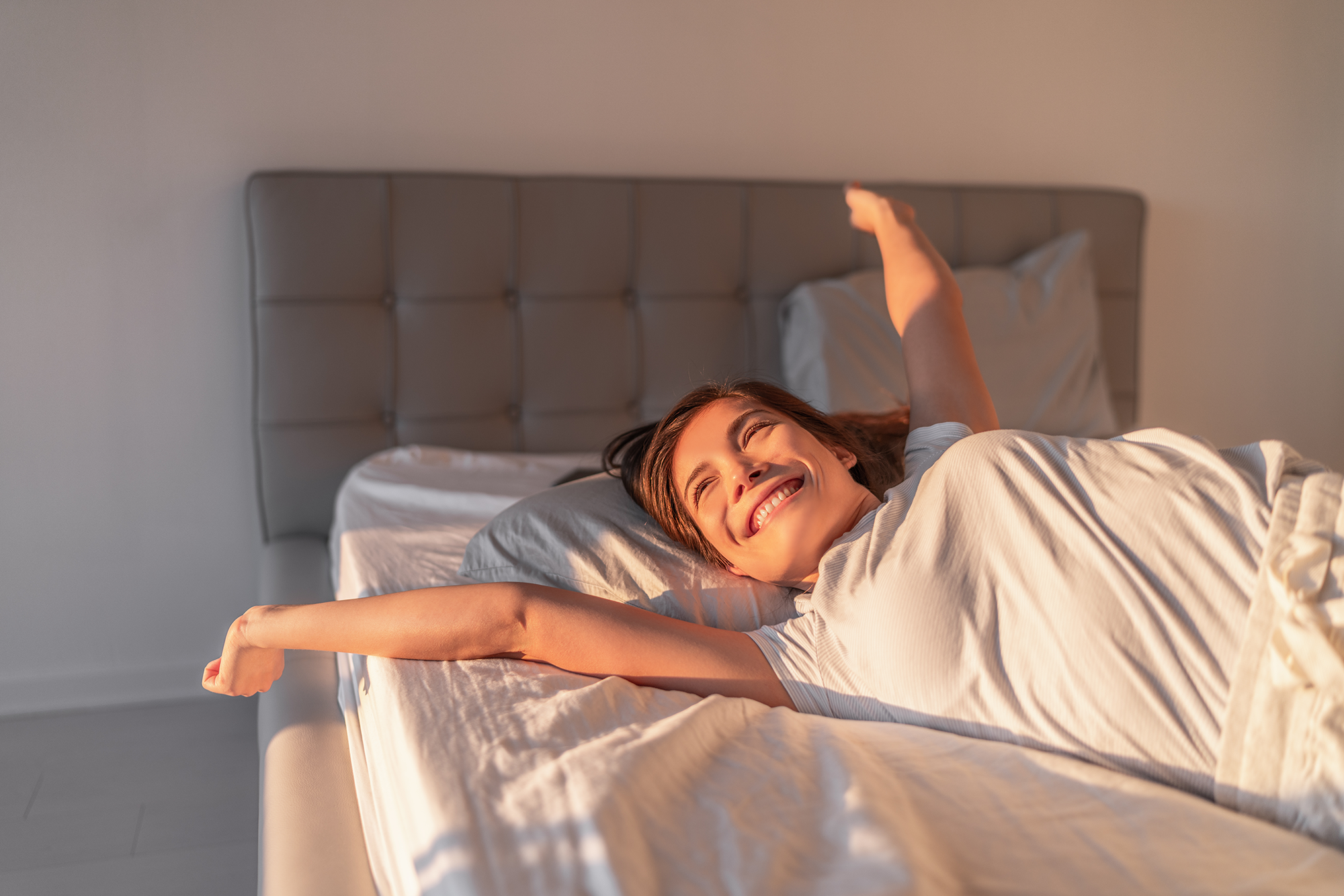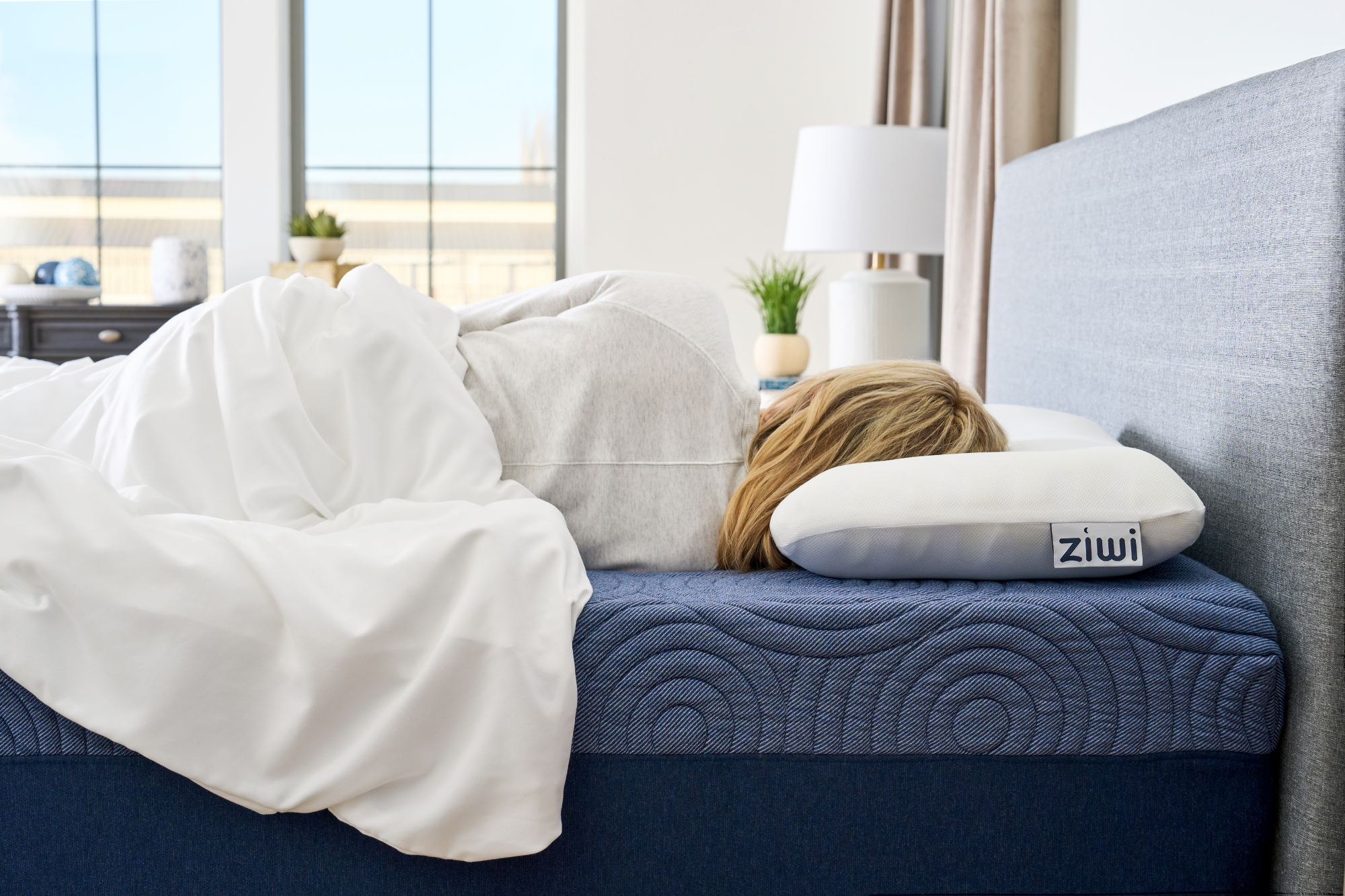Let’s be honest: sleep can feel like a mystery sometimes. You know you need it, you crave it, but somehow, no matter how exhausted you are, truly restful sleep can feel just out of reach. The thing is, it’s not just about how many hours you’re in bed; it’s about setting up the perfect sleep-friendly bedroom so that when you do hit the pillow, you’re actually getting restorative rest.
The Importance of a Sleep-Friendly Environment
Imagine this: You walk into a spa. The lights are dim, the air smells like lavender, and there’s soft music playing. Instantly, your body starts to relax. Now, picture walking into a bright, noisy office with fluorescent lights and coffee brewing. Same person, two environments—completely different reactions. Sleep works the same way. If your bedroom isn’t set up for rest, your body won’t fully settle into deep, restorative sleep.
In addition to healthy sleep habits, your sleep environment plays a major role in how well you sleep. From temperature to noise, every detail matters. So, let’s break down the sleep science of better rest, starting with the sneaky culprits that might be robbing you of it and then what you can do about them.
Looking for Sleep Thieves
Sleep thieves are those little (or not-so-little) things that interfere with your rest without you even realizing it. Some are obvious—like a too-bright bedroom—but others? Not so much. Here are a few of the biggest offenders:
Noises can be a major sleep disruptor because your auditory system never actually “turns off,” even while you sleep. That’s why sudden sounds—like a barking dog or a partner snoring—can pull you out of deep sleep.
Temperature plays a crucial role as well. If your bedroom is too hot or too cold, your body will struggle to stay asleep. The ideal bedroom temperature is between 65-67°F, which helps your body reach the cooler state it prefers for sleep. If you live in a multi-level home, make sure your thermostat is reflecting the true temperature of your bedroom—heat rises, so upper floors may be warmer than what your thermostat reads downstairs. Adjust vents, use fans, or opt for cooling bedding to keep your sleep friendly bedroom at the ideal temperature.
Substances like medications, alcohol, caffeine, and nicotine can all interfere with your sleep. Even if a nightcap makes you feel drowsy, alcohol disrupts your REM sleep and can cause you to wake up during the night, leaving you groggy the next day. So, if you're planning on enjoying that glass of wine, aim for earlier in the evening—at least 3-4 hours before you hit the pillow.
Similarly, caffeine can stay in your system for hours. It has a half-life of about 5-6 hours, meaning that if you drink a cup of coffee at 3 p.m., half of that caffeine is still circulating in your body by 8 p.m. For the best sleep, try to avoid consuming caffeine at least 6-8 hours before bed. If you are used to that afternoon coffee, try making it half caffeinated and half regular. You won’t be able to tell the difference, and your sleep will thank you! Also, if you find yourself reaching for coffee at 3 PM because… yawns…your bed or sleep environment might be the problem.
Emotional stressors can keep your mind racing when you should be winding down. Have you ever found yourself lying awake replaying an awkward conversation from three years ago? Stress and anxiety keep your nervous system activated, making it harder to fall and stay asleep. But there are solutions.
Physical tension can also be a sleep thief. If you’re waking up with aches and pains, your mattress or pillow might be the culprit. Your body is designed to wake you up if it senses pain, so if you’re sleeping on an unsupportive mattress, you might be waking up multiple times a night without even realizing it. The last thing you want is to keep falling back asleep repeatedly. A too-firm or too-soft mattress can create pressure points, or misalignment of your back, leading to tossing and turning all night. The right mattress, pillow, and bedding setup can help prevent this cycle, allowing you to sleep through the night without unnecessary disruptions.
The Downside of Fresh Air: How Open Windows Affect Your Sleep
There’s something undeniably soothing about a cool breeze drifting in while you sleep. But before you throw open the windows at night, consider what else might be sneaking in. Pollen, dust, mold spores, and other airborne allergens can make their way into your bedroom, irritating your airways and disrupting your sleep. If you wake up with a stuffy nose, itchy eyes, or a scratchy throat, your nighttime fresh air habit might be to blame. Using an air purifier or keeping windows closed—especially during high pollen seasons—can help minimize allergens in your sleep environment. If you love the feeling of fresh air, try cracking the window during the day instead and using an air filter in your bedroom to keep the air clean while you sleep.
Sleeping with Pets: Cozy or Catastrophic?
Let’s be honest—snuggling up with your furry friend can be one of the best parts of the night. The warmth, rhythmic breathing, and pure comfort of having your pet nearby can help some people relax and drift off more easily. However, pets aren’t always the best bedfellows. A sudden repositioning, tail flick, or midnight case of the zoomies can jolt you awake. And let’s not forget the constant, low-level awareness that comes with sharing your bed—because no one wants to be the person who accidentally rolls over on their pet in the middle of the night and gets their judgmental side-eye glance.
Beyond the occasional sleep disruption, pets that go outside during the day can bring allergens into your bedroom. Pollen, dust, and even grass can cling to their fur and paws, making their way into your bed. So after spending all that time and money picking out the perfect cooling, hypoallergenic sheets to help you sleep better, you then—ironically—invite a four-legged allergen sponge to roll around in them. If you notice congestion or sneezing in the mornings, your cuddly companion might be unknowingly contributing to the problem. Regular pet grooming, wiping their paws before bed, and using hypoallergenic bedding can help keep your sleep space allergen-free while still allowing you to enjoy those cozy snuggles if you decide to keep co-sleeping with your pet.
Are Sleep Trackers Secretly Sabotaging Your Sleep-Friendly Environment?
Sleep trackers have become a popular tool for those looking to optimize their rest, but relying too heavily on the data can sometimes do more harm than good. Sleep trackers are devices—usually wearable like smartwatches or fitness bands, but sometimes built into mattresses or bedside gadgets—that give you insight into how you sleep. While these devices can measure a variety of physiological signals and behaviors related to sleep and provide insight into general sleep patterns, they aren’t always accurate and can create unnecessary stress, leading to a phenomenon called orthosomnia—when anxiety over obtaining the perfect sleep scores makes it harder to sleep. Instead of fixating on numbers, focus more on creating a sleep-friendly environment that will lead to optimal rest.
If you enjoy using a sleep tracker, the key is to do so mindfully and with caution. Focus on long-term trends rather than fixating on nightly fluctuations and prioritize minimizing those pesky sleep thieves that can interfere with your rest. Simple adjustments to your sleep environment will do far more for your overall rest than any tracker ever could. Ultimately, listening to your body and making small, meaningful changes will lead to better sleep without the added pressure of constantly monitoring it.
Research-Backed Tips for the Best Sleep Space
Now that we’ve covered the potential sleep thieves, let’s talk about how to turn your bedroom into a sleep-friendly environment. Sleep science tells us that certain environmental factors can make a world of difference.
Light Management
Darkness signals your brain to produce melatonin, but even small light leaks can disrupt sleep. Blackout curtains are a great option, but if light still seeps in from the sides, magnetic strips can help seal the edges and keep your room completely dark.
For those who work late shifts, blue-light-blocking glasses can be a game-changer—especially if you need to drive home after work. They help prevent your body from getting mixed signals about day and night. Also, many smartphones have blue-light-filtering settings, so consider using those in the evening instead of exposing yourself to bright screens before bed.
Sound Optimization
Earlier, we touched on noise as a sleep thief, but let’s dive deeper because not all background noise is created equal. So called white, brown, pink, and green noise each have unique tones and frequencies, and what works for one person might not work for another. Brown and green noise are soothing sound frequencies that help promote sleep—brown noise has a deep, rumbling quality (like distant thunder or a waterfall), while green noise is a softer, nature-inspired soundscape (like rustling leaves or ocean waves), both working to calm the mind and block out disruptive noises. The key is to experiment and find the one that helps you relax and drift off into a peaceful sleep.
Be extra cautious if you rely on a TV to fall asleep. Even if you think it's just background noise, your brain is still monitoring your environment while you sleep. If a loud commercial, sudden music change, or unexpected dialogue shift happens, your brain may register it as an environmental change—waking you up.
Investing in the Right Bedding
Your body spends about a third of its life in bed, so your mattress and bedding matter. If you’ve ever woken up feeling like you just wrestled a bear, your sleep surface might be to blame. A supportive mattress can prevent back pain and pressure points, while cooling or breathable sheets help regulate body temperature so you don’t wake up sweating. The right pillow supports your neck and spine, reducing stiffness, and a breathable comforter keeps you warm without overheating.
Beyond just comfort, bedding plays a psychological role in your sleep experience. Soft, high-quality sheets and cozy blankets can create a sense of security, making it easier for your body to relax. Weighted blankets, in particular, have been shown to reduce cortisol levels, easing stress and anxiety for deeper sleep. Natural materials like cotton or bamboo are excellent choices for sheets because they wick moisture and promote airflow, ensuring you stay comfortable all night.
Pillows also deserve attention. If you find yourself constantly flipping your pillow for the "cool side," consider a temperature-regulating pillow made with heat-releasing or air flow promoting technology. Likewise, side sleepers may benefit from a contoured pillow or pillow with internal neck support built in, that keeps the spine aligned, preventing neck pain. Investing in the right bedding isn’t just about luxury— it’s a necessity for quality sleep.
The Nighttime Ritual: Would Your Home Know It’s Time for Bed?
If someone walked into your home an hour before bed, would they know someone was about to sleep? Probably not. Now, think about a child’s bedtime routine—bath, pajamas, a bedtime story, soft lighting. We create the perfect wind-down ritual for kids, but for ourselves? We scroll on our phones and crash into bed, expecting our brains to shut off immediately. Spoiler: They won’t.
Now that you’re aware of how to set up your sleep environment and address common sleep disruptors, it’s time to focus on building a bedtime routine for yourself that signals to your body that it’s time to wind down. By incorporating the right habits into your nightly ritual, you can help prepare your mind and body for a more restful night’s sleep. Here are some simple, sleep science-backed steps to enhance your nighttime routine:
• Take an Outside Walk for Fresh Air: A great way to regulate your body’s circadian rhythm, which in turn helps you fall asleep faster and more naturally.
• Listen to Brown or Green Noise: These sounds can be more soothing than traditional white noise, helping to mask disruptive background noise and calm your mind.
• Practice Deep Breathing Exercises: Activates your parasympathetic nervous system, which helps to relax your body and mind before sleep.
• Calming Music: Slow, instrumental melodies can cue your body to wind down and create a more relaxing atmosphere.
• Take a Warm Bath or Shower: The slight drop in body temperature afterward mimics natural sleep signals and promotes feelings of drowsiness.
• Read a Physical Book (Not a Screen): Helps ease your mind and distance yourself from the stimulation of electronic devices.
• Wear Comfy, Breathable Pajamas: Soft fabrics can make a surprising difference in comfort, making it easier for your body to relax and settle in for sleep.
• Dim the Lights: Lowering the brightness of your home mimics the natural light changes of the evening, signaling to your body that it’s time to rest.
• Drink a Warm, Caffeine-Free Beverage: Herbal teas like chamomile or lavender can be soothing and help prepare your body for sleep. However, be mindful of drinking too close to bedtime if you tend to wake up frequently during the night to use the bathroom. Too much liquid can disrupt your sleep cycle, so aim to stop drinking any fluids at least one to two hours before you head to bed.
• Limit Outside Distractions: Ensure your sleep environment remains calm and quiet, free from unnecessary noise and interruptions.
• Use Calming Oils in a Diffuser: Lavender or chamomile oils can enhance relaxation and make your environment more restful.
• Apply Lavender Bath Oils or Lotion: This can reduce stress levels, making it easier to unwind before bed.
• Use a Weighted Blanket: The gentle pressure from a weighted blanket can reduce anxiety, improve relaxation, and promote deeper sleep.
• Pray or Meditate: For those who find comfort in these practices, they can help ease stress and prepare your mind for restful sleep.
• Journal: Writing down your thoughts helps clear mental clutter and prepares you to sleep more peacefully.
• Progressive Muscle Relaxation: Slowly tensing and releasing each muscle group helps your body fully unwind, easing physical tension before sleep.
Final thoughts: Set Yourself Up for Sleep Success
Better sleep isn’t just about what happens in bed—it’s about how you prepare for it. By creating a sleep-friendly environment, identifying sneaky sleep thieves, and establishing a nighttime routine, you can finally get the rest you deserve.
Now, take a moment to look at your bedroom. Does it feel like a peaceful retreat? Or is it more like an extension of your office, a catch-all for clutter, or the land of forgotten laundry? Small changes can make a big impact on your sleep quality.
Sweet dreams, my friend!




